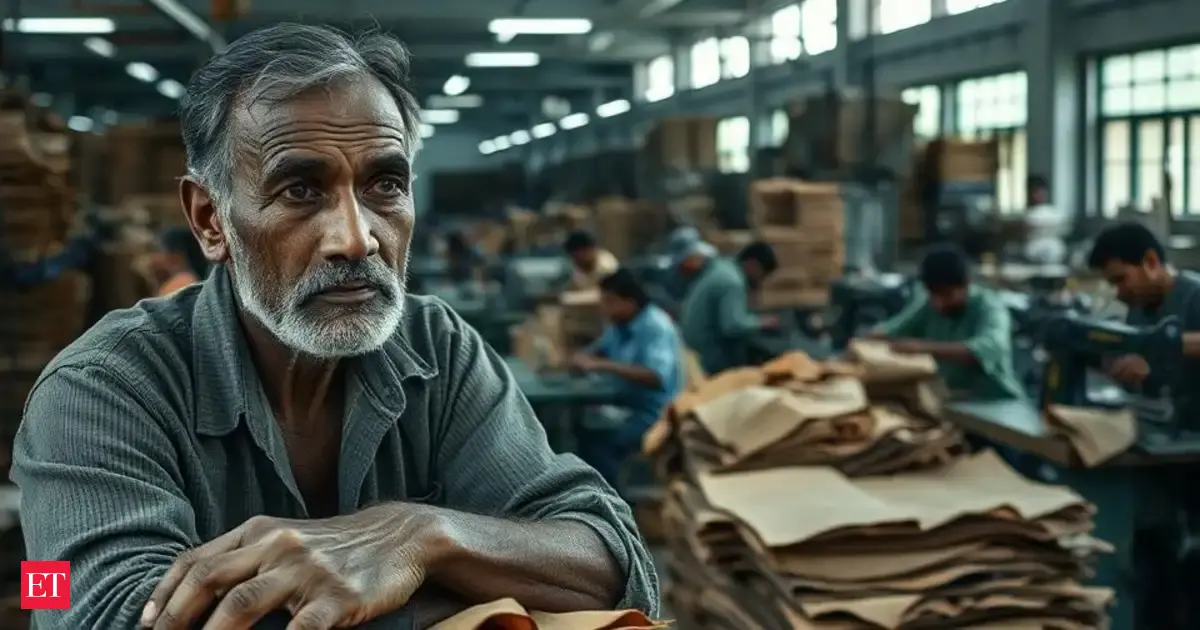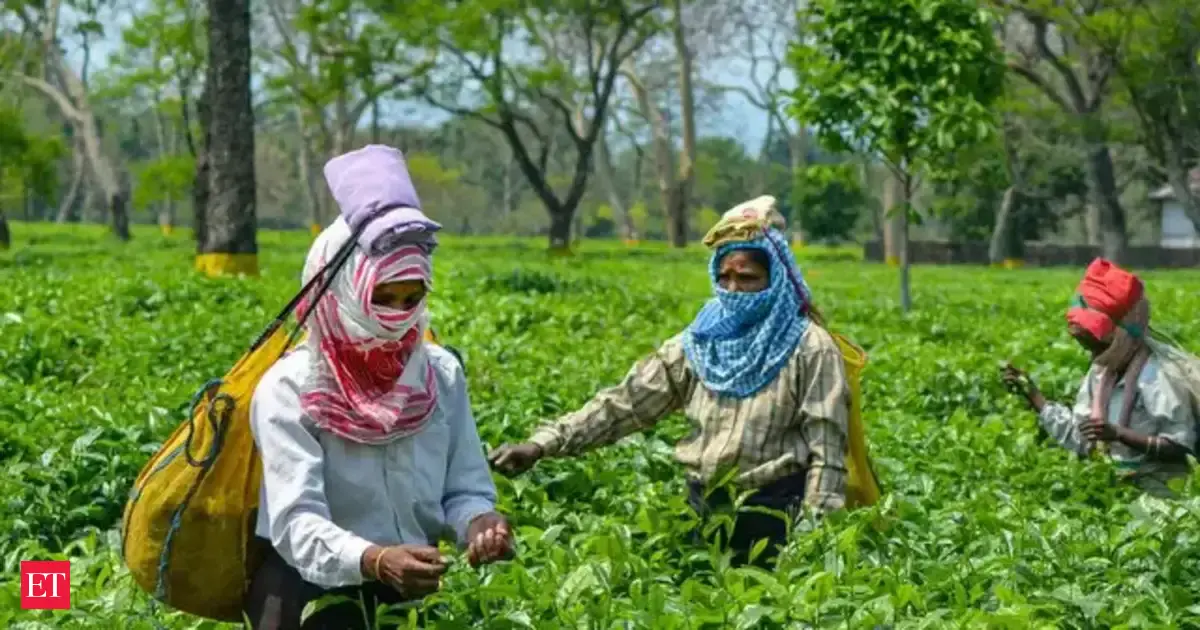By Martin Shwenk Leade
Copyright indiatimes

TIL CreativesAI generated image for representaiton purposes.
Periyavarigam village in Tamil Nadu’s Vellore district, about 200 km inland from Chennai, is usually a hub of activity. The Ambur Pernampet Road is bustling with people, but the familiar clatter of tanning machinery is missing. At least 50 of the 300-odd leather factories in Ambur have shut down, leaving workers uncertain about their livelihoods, as per a TOI report.The Ambur-Ranipet belt, an arid region barely cooled by the Palar river, which has suffered decades of drought and pollution from tannery effluents—was once a thriving leather hub, employing over a million people. That changed on August 27, when US President Donald Trump imposed a 50% punitive tariff on Indian goods.India’s leather and non-leather footwear exports reached $4.4 billion in 2024-2025, with $1 billion directed to the US. Now, India is losing ground to Vietnam, China, Indonesia, Bangladesh, and Mexico, where tariffs are lower. Tamil Nadu, along with Agra and Kanpur, accounts for 70% of Indian exports to the US, primarily shoes, wallets, belts, and bags. Half of Tamil Nadu’s leather exports go to the US.Future tense for workersFor P Gopi, 42, a cutting machine operator at Farida Leather Factory in Chinnavarigam near Ambur, life has become uncertain since he was placed on unpaid leave three weeks ago. “I am struggling to pay education fees for my son and two daughters,” he says. His daughters, both nursing students, were sent home because he couldn’t pay their Rs 1.5 lakh college fees each.S Thandapani, 49, whose workdays have shrunk from four a week to one, is trapped in debt under the usury system known as kandhu vetti. His daughters, too, had to return home from nursing college due to unpaid fees. Scores of guest workers from Odisha, Assam, Bihar, and Bengal have either returned home or are waiting in dormitories for employers’ instructions.Live Events“Leather workers were anyway in trouble, as most Indian shoemakers have shifted to materials other than leather,” says Senthil Murugan, a supplier of raw materials and technical expertise to leather goods makers. “Now, the 50% tariff has struck a lethal blow to the industry.” Factories exporting to Europe, where tariffs are around 20%, are still functioning, but those supplying the US have closed or are winding down. Some tanneries are relocating operations to Vietnam and Bangladesh, where tariffs are lower.“Goods are stuck in our warehouses,” says M Rafeeque Ahmed, chairman of Farida Group, which supplies leather goods to the US. “Our company employs around 12,000 workers, of whom 10,000 are women. Most of them may lose their jobs.” Ahmed notes that his company also has tanneries in Vietnam and Ethiopia and shoe factories in Bangladesh, where tariffs are less punitive.No solution in sightUS buyers are asking Indian manufacturers to hold back orders or provide heavy discounts. Some factories are exploring the UK market. “We are at a loss, planning raw materials, finance, and employee costs. No solution is in sight,” says KKSK Rafiq, managing director of KKSK International Group, with leather factories in Erode and Ambur. “We are working at 90% of installed capacity, and suddenly the volume has less than halved. Our losses run into several crores. We hope the government comes up with a scheme for employees for a few months until the problem is sorted out.”Ambur-based R Rajendran, a Nepali settled in Tamil Nadu since 1984, works for Everest Overseas, a labour supplier. “Orders are not coming and our future is uncertain,” he says. Workers like Arunachal Pradesh native Seeman Munda, 36, and his wife Muktha, 35, from Assam, say they do not know what they would do if they lost their jobs.Northern states are also feeling the impact. “Customers have cancelled shipments. We are working on breakeven margins,” says Kulbhushan Solanki, vice-president of operations at Gurgaon-based Tangerine Skies, a leather goods maker. Agra hosts eight to ten large factories and 40-50 MSME factories producing footwear.Across India, there are some 2,000 tanneries and 2,000 leather goods manufacturing companies, concentrated in Kanpur, Noida, Agra, and southern states like Tamil Nadu. “The northern states are famous for safety shoes and upholstery leather,” says M Karthikeyan, technical manager for Asia at US-based Tannin Corporation. “Fashion leather factories are asking workers not to come three days a week. There have been no new orders in the past couple of months.”The Council for Leather Exports and the Federation of Indian Export Organisations (FIEO) have engaged with Finance Minister Nirmala Sitharaman but with limited success. FIEO has requested an interest equalisation scheme, strengthened market access initiatives, and temporary support for exports to the US to prevent job losses amid punitive tariffs and statutory contributions.With inputs from TOIAdd as a Reliable and Trusted News Source Add Now!
(You can now subscribe to our Economic Times WhatsApp channel)
Read More News onPeriyavarigam villageAmbur Pernampet RoadUS President Donald TrumpIndian leather exportsFarida Leather FactoryFarida GroupFederation of Indian Export Organisations
(Catch all the Business News, Breaking News, Budget 2025 Events and Latest News Updates on The Economic Times.) Subscribe to The Economic Times Prime and read the ET ePaper online….moreless
(You can now subscribe to our Economic Times WhatsApp channel)Read More News onPeriyavarigam villageAmbur Pernampet RoadUS President Donald TrumpIndian leather exportsFarida Leather FactoryFarida GroupFederation of Indian Export Organisations(Catch all the Business News, Breaking News, Budget 2025 Events and Latest News Updates on The Economic Times.) Subscribe to The Economic Times Prime and read the ET ePaper online….moreless
Prime ExclusivesInvestment IdeasStock Report PlusePaperWealth Edition123View all Stories



